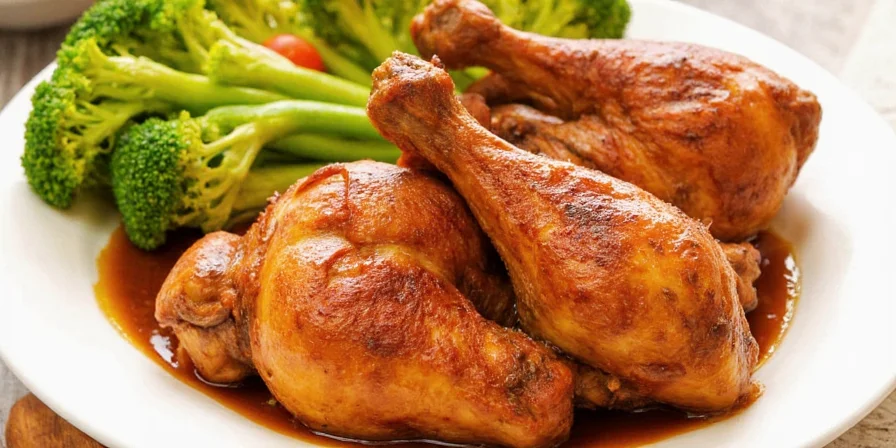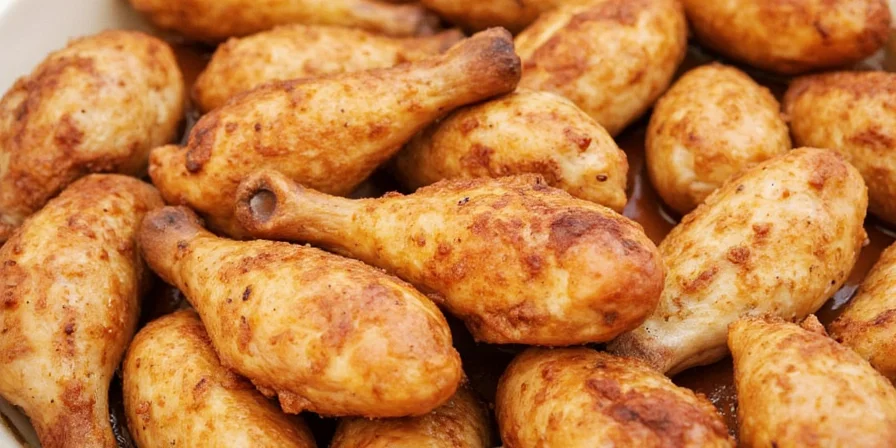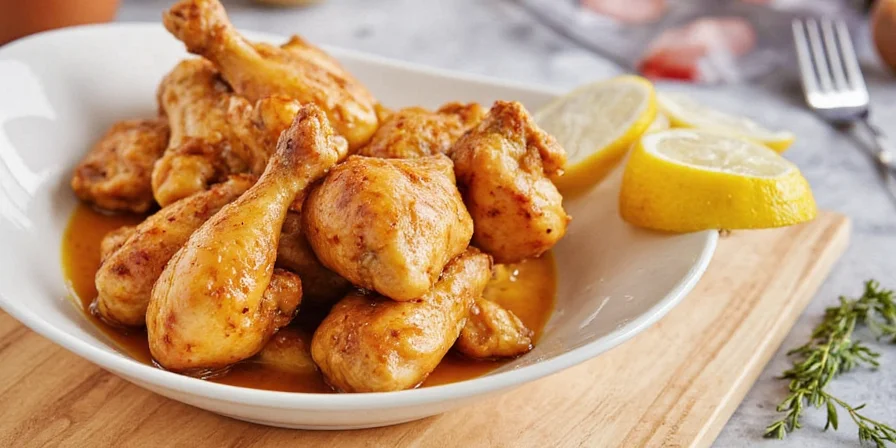Stop serving bland chicken! Get juicy, flavorful results every time with these 10 practical seasoning techniques used by professional chefs. This guide cuts through confusing advice to deliver exactly what works - with clear measurements, timing guides, and common mistakes to avoid. Whether you're cooking chicken breasts, thighs, or wings, you'll discover how to achieve restaurant-quality flavor with basic ingredients you already have.
Table of Contents
- Quick-Start Chicken Seasoning Formula (Works in 5 Minutes)
- Why Chicken Turns Out Bland (And How to Fix It)
- 10 Proven Chicken Seasoning Techniques That Actually Work
- Simple Spice Guide: What to Use and When
- Marinating Times That Won't Ruin Your Chicken
- 3 Cultural Flavor Systems Anyone Can Master
- Perfect Sauce Pairings for Every Chicken Style
- 7 Common Seasoning Mistakes (And How to Fix Them)
- Quick Reference Cheat Sheet
Quick-Start Chicken Seasoning Formula (Works in 5 Minutes)
For perfectly seasoned chicken every time, use this simple formula:
- Dry brine: 1 teaspoon salt per pound of chicken, rubbed under skin if possible
- Dry rub: 2 parts paprika, 1 part garlic powder, 1/2 part black pepper
- Oil: 1 tablespoon olive oil or melted butter per pound
Apply salt 30-45 minutes before cooking, then add rub and oil right before cooking. This works for any cooking method and takes less than 5 minutes of active time.

Why Chicken Turns Out Bland (And How to Fix It)
Chicken becomes bland because its lean protein structure doesn't hold flavor well. Unlike fatty meats that self-baste, chicken needs proper seasoning timing and technique. The solution isn't more spices - it's using them correctly. Three key principles make all the difference:
- Timing matters most: Salt needs 30-45 minutes to penetrate (but too long dries it out)
- Dry vs. wet matters: Oil-based rubs stay put during cooking, while wet marinades can make chicken soggy
- Layering matters: Apply different spices at different cooking stages for maximum flavor
10 Proven Chicken Seasoning Techniques That Actually Work
- The 30-minute salt rule: Sprinkle 1 tsp salt per pound of chicken 30-45 minutes before cooking for juicy results (no need to rinse)
- The perfect basic rub: Mix 2 tbsp paprika, 1 tbsp garlic powder, 1 tbsp onion powder, 1 tsp black pepper for all-purpose seasoning
- Butter-basting secret: During last 5 minutes of cooking, baste with melted butter mixed with fresh herbs
- Acid at the end: Squeeze fresh lemon or lime juice AFTER cooking (not before) to brighten flavors without toughening
- The yogurt trick: Marinate in plain yogurt + spices for 2-4 hours for tender chicken (not longer!)
- Spice toasting: Heat whole cumin or coriander seeds in dry pan 1-2 minutes before grinding for deeper flavor
- The resting rule: Let chicken rest 8-10 minutes after cooking before cutting to keep juices inside
- The oil buffer: Coat chicken in thin layer of oil before applying dry rub to help spices stick
- Finishing salts: Sprinkle flaky sea salt right before serving for flavor bursts
- The flavor boost: Add 1 tsp soy sauce or Worcestershire to dry rubs for umami depth (no soy flavor)

Simple Spice Guide: What to Use and When
Confused about which spices work best? This quick reference shows exactly what to use for different cooking methods:
| Cooking Method | Best Spices | When to Apply | Proportion Tips |
|---|---|---|---|
| Grilling/Broiling | Paprika, cumin, garlic powder | Right before cooking | 2 parts paprika to 1 part garlic |
| Baking/Roasting | Thyme, rosemary, sage | After salting, before oil | 1 tsp dried herbs per pound |
| Pan-searing | Onion powder, black pepper | Right before cooking | Equal parts onion and pepper |
| Slow cooking | Cumin, coriander, turmeric | At beginning with liquid | 1 tsp per pound of chicken |

Marinating Times That Won't Ruin Your Chicken
Marinating seems simple but timing is critical. Too short = no flavor. Too long = mushy texture. Follow these exact times:
- Acid-based marinades (lemon, vinegar): 30 minutes to 2 hours max (longer = tough meat)
- Dairy-based marinades (yogurt, buttermilk): 2-4 hours (longer = mushy texture)
- Dry rubs with salt: 30-45 minutes before cooking (no longer needed)
- Dry rubs without salt: Can be applied right before cooking
- Oil-based marinades: 2-12 hours (oil helps flavors penetrate without damaging texture)
Never marinate chicken in the refrigerator for more than 24 hours - after that, texture suffers with no additional flavor benefit.

3 Cultural Flavor Systems Anyone Can Master
Instead of complicated recipes, try these simple cultural approaches that guarantee great flavor:
- Mediterranean: Lemon juice + oregano + garlic + olive oil (apply lemon AFTER cooking)
- Mexican: Cumin + smoked paprika + garlic powder + onion powder (toast spices first)
- Asian: Soy sauce + ginger + garlic + sesame oil (limit soy to 1 tbsp per pound to avoid saltiness)
Each system uses just 4 ingredients but creates completely different flavor profiles. The secret is using the right proportions - too much of any one ingredient throws off the balance.

Perfect Sauce Pairings for Every Chicken Style
Pairing sauces correctly makes or breaks your chicken dish. Match these simple sauces to your seasoning style:
- Spicy chicken: Cool with yogurt-based sauces (tzatziki) - the fat cuts the heat
- Garlicky chicken: Brighten with lemon-dill sauce (1/4 cup Greek yogurt + 1 tbsp lemon + 1 tsp dill)
- BBQ chicken: Balance with creamy coleslaw (the crunch refreshes your palate)
- Teriyaki chicken: Serve with quick-pickled cucumbers (vinegar cuts the sweetness)
- Herb-roasted chicken: Drizzle with pan juices mixed with 1 tbsp butter
No complicated recipes needed - these take 5 minutes to prepare while your chicken rests.

7 Common Seasoning Mistakes (And How to Fix Them)
Avoid these errors that ruin otherwise good chicken:
- Mistake: Applying salt right before cooking
Solution: Salt 30-45 minutes ahead for better penetration - Mistake: Using pre-ground spices that have lost potency
Solution: Rub between fingers - if no strong aroma, replace them - Mistake: Marinating too long in acidic ingredients
Solution: Keep acid-based marinades under 2 hours - Mistake: Adding wet ingredients to dry rubs
Solution: Apply dry rubs to dry chicken, then add oil or wet ingredients - Mistake: Cutting chicken immediately after cooking
Solution: Rest 8-10 minutes to keep juices inside - Mistake: Overcrowding spices (more isn't better)
Solution: Use no more than 1.5 tsp total spices per pound - Mistake: Using old oil that's gone rancid
Solution: Replace cooking oils every 3 months
Quick Reference Cheat Sheet
Save this checklist for perfect chicken every time:
- ✓ Salt 30-45 minutes before cooking (1 tsp per pound)
- ✓ Pat chicken DRY before applying spices
- ✓ Apply dry rubs right before cooking
- ✓ Add acid (lemon/vinegar) AFTER cooking
- ✓ Rest 8-10 minutes before cutting
- ✓ Replace spices every 6 months (test by rubbing - no smell = replace)
- ✓ Never marinate in acid more than 2 hours
Follow these seven steps and your chicken will taste restaurant-quality every time - no fancy equipment or hard-to-find ingredients needed.

Frequently Asked Questions
How much salt should I use for chicken?
Use 1 teaspoon of salt per pound of chicken. Apply 30-45 minutes before cooking for best results. No need to rinse off - this amount won't make your chicken too salty and helps keep it juicy.
Can I use the same seasoning for chicken breasts and thighs?
Yes, but adjust timing. Breasts need less marinating time (max 2 hours for acid-based marinades) while thighs can handle longer (up to 12 hours). For dry rubs, use the same amounts but thighs can handle bolder flavors.
Why does my chicken always turn out dry?
Three common reasons: 1) Not salting early enough (salt helps retain moisture) 2) Overcooking (chicken is done at 165°F internal temperature) 3) Cutting too soon after cooking (rest 8-10 minutes first). Fix these three issues and your chicken will stay juicy.
What's the best all-purpose chicken seasoning?
Mix 2 tablespoons paprika, 1 tablespoon garlic powder, 1 tablespoon onion powder, and 1 teaspoon black pepper. This blend works for any cooking method and creates perfectly balanced flavor without overpowering the chicken.
How do I know if my spices are still good?
Rub a small amount between your fingers. If you can't smell a strong aroma, they've lost potency. Ground spices last about 6 months, whole spices up to 2 years. Store in airtight containers away from heat and light.











 浙公网安备
33010002000092号
浙公网安备
33010002000092号 浙B2-20120091-4
浙B2-20120091-4